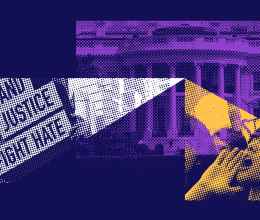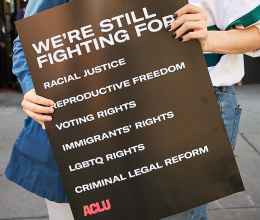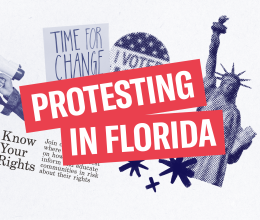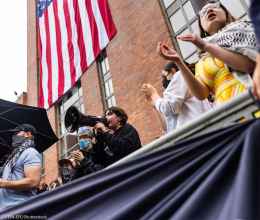
SURFSIDE, FL – In response to a memorandum issued by Surfside Mayor Shlomo Danzinger calling for local legislation that would criminalize sleeping, showering and requesting help in public places, three legal advocacy organizations have jointly submitted a letter to the mayor and town commissioners notifying them that such legislation would be unconstitutional.
The National Homelessness Law Center, the American Civil Liberties Union (ACLU) of Florida, and Southern Legal Counsel urge the Town of Surfside to stop the drafting of the legislation proposed by the mayor “and instead divert the funding that would be spent developing and enforcing the ordinance to investment in housing and services that would end homelessness in Surfside.”
The letter cites the mayor’s memorandum, which is meant to inform the drafting of the proposed legislation in Surfside. The memo suggests prohibiting “activities or conduct that obstruct public sidewalks and rights-of-way, such as sitting, sleeping, lying, or loitering in a manner that inhibits the free, safe, convenient and normal use of public rights-of-way…” The mayor’s memorandum also recommends prohibiting sleeping in public places such as at the beach or in parks.
“Not only is this kind of criminalization of homelessness violative of the Eighth Amendment in its punishment of life-sustaining conduct in public places in the absence of indoor alternatives, it is also likely to violate the First Amendment by restricting the solicitation of donations, which has been designated as protected speech in a long line of Supreme Court cases,” the advocacy organizations write. The advocates state that the proposed ordinances “will unjustly and unconstitutionally punish people for existing in public spaces, even when they have no indoor alternative place to be.” The advocates provide city officials with a review of relevant case law, including:
- Pottinger v. City of Miami, in which the Southern District of Florida held that the City’s “custom, practice and policy of arresting, harassing and otherwise interfering with homeless people for engaging in basic activities of daily life … in the public places where they are forced to live” was unconstitutional.
- Martin v. Boise, in which the Ninth Circuit ruled that punishing a person experiencing homelessness for sitting, sleeping, or lying on public property in the absence of adequate alternatives constitutes cruel and unusual punishment under the Eighth Amendment.
- McArdle v. City of Ocala, where the Middle District of Florida enjoined Ocala from enforcing its open lodging ordinance because the city did not have enough shelter space for its residents experiencing homelessness and law enforcement did not inquire into the availability of shelter space before enforcing the ordinance.
Southern Legal Counsel, the ACLU of Florida, and pro bono attorney Andy Pozzuto represented the plaintiffs in McArdle.
“Courts in Florida and nationwide have made it clear: you cannot punish people for existing in public when they have no options. Individuals experiencing homelessness have the same constitutional rights as everyone else, including the right to be in public spaces and the First Amendment right to request charity,” said Jacqueline Azis, staff attorney with the ACLU of Florida. “Instead of finding ways to punish people for conduct that is imperative to their survival, Surfside should spend its resources addressing the root causes of homelessness and helping residents who are experiencing homelessness.”
Southern Legal Counsel, the ACLU of Florida, and the National Homelessness Law Center have also successfully sued governments in Florida and nationwide whose restrictions on requests for help in public places violated the First Amendment to the U.S. Constitution.
Recent cases challenging such restrictions in the cities of West Palm Beach, Ocala, Lake Worth Beach, Fort Lauderdale, as well as Palm Beach and St. John’s counties, have resulted in favorable outcomes for persons experiencing homelessness, including findings of unconstitutionality, repeals of challenged laws, injunctive relief in favor of Plaintiffs, and/or settlement agreements. These ordinances, which have all been rescinded, repealed, or enjoined, were similar to the legislation proposed for Surfside by Mayor Danzinger.
Lily Milwit, an attorney with the National Homelessness Law Center, said the Center’s tracking of litigation challenging the criminalization of homelessness has found that 100 percent of lawsuits challenging panhandling bans since 2015 have resulted in favorable outcomes for Plaintiffs.“These findings reflect what we know about laws, like those on the table in Surfside, that make it illegal or impossible to exist in public spaces while unhoused: they are ineffective, inhumane, and ultimately unconstitutional,” Milwit said.
Southern Legal Counsel attorney Chelsea Dunn said ordinances that prohibit or limit charitable solicitation or panhandling are making content-based restrictions on speech in violation of the First Amendment, and they do not in any way resolve the underlying problem of homelessness.
“The U.S. Department of Justice says it best: ‘Criminalizing homelessness is both unconstitutional and misguided public policy, leading to worse outcomes for people who are homeless and for their communities,’” Dunn said.
A link to the letter can be found here.







